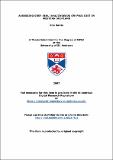Assessing grey seal (Halichoerus grypus) diet in western Scotland
Abstract
Grey seal diet was last comprehensively studied in western Scotland in 1985. Since then, the grey seal population has increased by approximately 30% and relative abundance of fish stocks in the area has changed markedly. The aim of this study was to provide a current assessment of diet to inform policy issues related to the impact of the still increasing grey seal population on commercial fish populations. During 2002, nine sampling trips totalling 56 days were completed around western Scotland, resulting in the collection of 1,589 grey seal scats. Forty-nine prey species were recorded in these samples revealing that grey seals on the west coast of Scotland remain highly catholic in their diet. Seasonal and regional variation in diet composition was assessed and the annual consumption of commercial fish species estimated. Proportions, by weight, of prey species indicated that gadoids were the main prey. Sandeels were also an important component of the diet. Comparisons between 1985 and 2002 revealed many similarities in diet composition but declines in the importance of sandeels, ling and megrim were balanced by increases in haddock, lemon sole, pelagic species and several benthic species. Changes in the size of fish stocks partially explain some of these changes. One exception is cod, which, despite very low abundance in 2002, formed a significant part of grey seal diet in western Scotland. Results from this study highlight the need for better methods for assessing absolute stock abundances for ‘critical’ fish species west of Scotland. Reducing the uncertainty over estimates of grey seal population size would also improve consumption estimates. The results from this study will be important to conservation and fisheries managers in Scotland.
Type
Thesis, MPhil Master of Philosophy
Collections
Items in the St Andrews Research Repository are protected by copyright, with all rights reserved, unless otherwise indicated.

